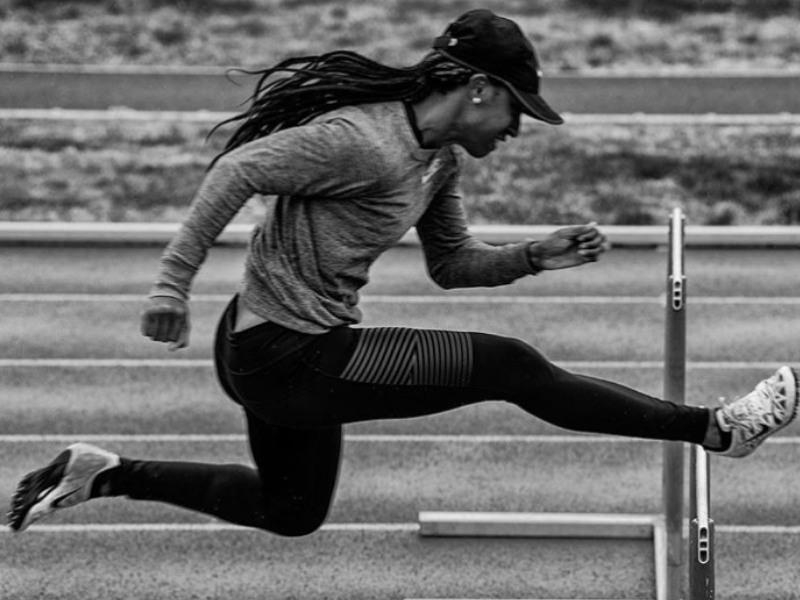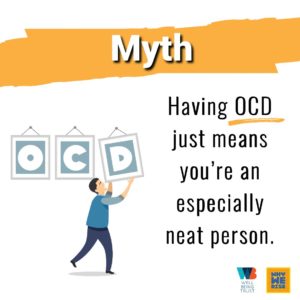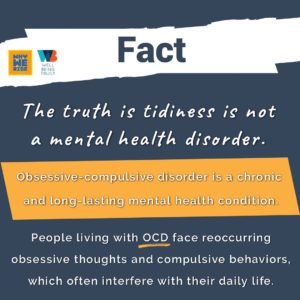For quite some time the world of elite sports hasn’t been a place to openly discuss mental health, nor a place that actively prioritized it. In recent years, we have seen an evolution in those attitudes toward mental health in the sporting world, as more athletes open up about their experiences, and as the country continues to learn just how common mental health conditions are—affecting one in five of all Americans, whether they are regular fans like the most of us, or athletes at the very height of their game.
We were lucky to have a chance to talk with just such an athlete, Brianna Rollins-McNeal, Olympic gold medalist, about mental health, physical health, and how the two are part of the same equation. Rollins-McNeal specializes in the 100-meter hurdles, placing first in both the 2016 Olympics, and the 2013 World Championship. Her time, at 12.26 seconds, is the fourth-fastest run ever recorded. Getting to that level of competition, Rollins-McNeal, tells us, “Entails mental training just as much as physical training.”
Our conversation touches on the intersection of physical training and mental training, the pressures of elite athletics, and the importance of mental health for both athletic performance, and for a fulfilled life. Read on for more.
We don’t know exactly what it takes to become one of the fastest runners in the world, but we’re willing to guess it didn’t happen overnight. You’re putting your body to its limits, day after day—how does all the training, the competing, test your mental health?
Track and field entails mental training just as much as physical training. Being that it is an individual sport it tests a lot of patience, self-awareness, and mental capacity. On days when I do not want to train, I have to really give myself a pep talk. Sometimes when my body isn’t responding in a way I would like it to, I have to count on my mind to carry me through. Being a hurdler it takes a lot of concentration to compete, and to compete well every single time takes a lot of mental focus. So I can say that this sport has tested my mental health in every way you can imagine. I have been high and low throughout my career, and that rollercoaster reminds me to take care of my mental health.
As a professional athlete, you spend quite a bit of time training your body, perfecting your physical health, watching your nutrition and so on. In the mental health space, we’re continuing to learn just how deeply interconnected physical health and mental health are. Could you talk to us about the ways in which you notice that mind-body connection?
Mental health is so important to me not only as a professional athlete but as a human being. In whatever condition my mind is that’s how my body response especially while competing. I practice meditation and mindfulness on a daily basis to prepare myself for training and competition.
Historically, the arena of elite sports hasn’t always been a place where mental health issues have been spoken about openly. In recent years, more and more athletes are speaking up about their mental health. As an elite athlete yourself, do you see the sporting world’s attitudes toward mental health evolving?
I definitely see mental health evolving in the sports world. I think when one person speaks up about their mental health it opens doors for others to relate and become vulnerable enough to speak up about their mental health. It’s shedding light on a battle I’m sure has been around for centuries, and it’s allowing our peers to understand that they’re not alone. As athletes, it takes more than physical abilities to accomplish any goal. As mental health evolves in sport, I hope more resources and understanding become available.
How does caring for your health and mental well-being translate into the little, day-to-day things?
Caring for my health and mental well-being is vital to my everyday living. It helps my attitude, daily tasks, and energy. I put out what I put within; metaphysical to the physical.
Where do you turn to when you need emotional support, and what has that support meant to you?
I turn to God first, I pray, journal, meditate on scriptures that are comforting to me in those moments. That has been my foundation for the past few years and it sustains me. My husband has also been there for me when I needed any kind of support. That has meant everything to me, knowing that I have someone by my side. My mentor is like a father to me. He has taught me so many things and has been a great guide on my spiritual walk.
We heard you were the eldest of seven children, and the only daughter! That’s a lot of brothers running around. Could you tell us a bit about the ways that has shaped you as an adult, and what it was like, growing up with so many siblings?
Being the eldest of seven children was definitely a lot. I also felt like I was kind of their second mom. Having that kind of weight on my shoulders became hard as I got older and I had my own life and responsibilities. When I turned pro, I felt like I always had to take care of them. I was always worried about their well-being, but then I had to realize that was not my responsibility. That shaped me into a strong, independent, courageous, resilient woman.
Was mental health something you spoke openly about in your family, growing up? With so many heads under one roof, what sort of mental health challenges did your family face, and how did you family cope with them?
Honestly, mental health was never spoken of in my household. Though there were many mental health challenges going on right under my eyes, I was unaware because I didn’t have the knowledge or the awareness of mental health back then.
Many people are still afraid to talk about their own mental health issues. What advice do you have for them?
I would say, never be afraid. We are all going through some sort of mental battle as a human race. Be vulnerable, Share your story. You never know who may be going through the same thing, how many lives you can change, and it will be freeing for you. Be patient, loving, and compassionate to yourself.
In 2016, not only did you win your gold medal, but your teammates, who finished in second place and third, joined you at the podium, making you the first American woman to achieve such a sweep at the Olympics. Could you tell us about that moment? And what advice would you give to young women and men who are trying to pursue their own dreams?
That was one of the greatest moments of my life. My teammates and I joined in prayer the morning of competition and after that we just let our mind, body, spirit do what it already knew to do. When people come together as one trying to accomplish something, barriers are broken, legacy is made. So, my advice would be to stay true to who you are, continue to work hard for whatever it is you dream of, believe in it wholeheartedly and anything can happen.
Add your voice to the mental health conversation! How do you notice the connection between mind and body, and how do you prioritize your whole-person health? Join the conversation online using the hashtags #BeWell, #BeHeard, and #BeThere.
If you or someone you know is having a difficult time and would like to talk to someone about it, there are people who want to help. For teens who want to talk to other teens, call Teen Line at 310-855-4673, or text TEEN to 839863. You can also text LA to 741741 to talk with a trained Crisis Counselor for free, 24/7. For more information









